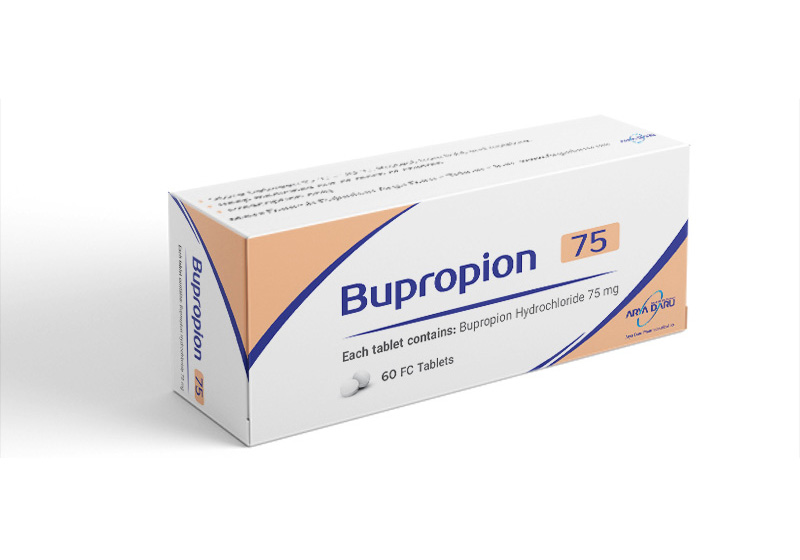Bupropion 75 mg
Each tablet contains:
Bupropion Hydrochloride 75 mg
Drug class:
Antidepressants.
General information:
- Administer without regard to meals.
- Missed dose: Skip the missed dose and go back to your normal time. Do not take 2 doses at the same time or extra doses.
Mechanism of Action:
Bupropion selectively inhibits the neuronal reuptake of dopamine and norepinephrine.
Indications and Dosage:
Adults:
- Major depressive disorder: Initially, 100 mg PO twice daily; titrate after no less than 3 days to 100 mg PO 3 times per day if needed.
Maximum dose 150 mg as a single dose and 450 mg/day
Contraindications:
Hypersensitivity to bupropion or other components of the formulation; seizure disorder; history of bulimia or anorexia nervosa; patient undergoing abrupt discontinuation of ethanol or sedatives; including benzodiazepines, barbiturates, or antiepileptic drugs; use of MAO inhibitors (concurrently or within 14 days of discontinuing either bupropion or the MAO inhibitor). Patients receiving linezolid or intravenous methylene blue.
Other conditions that increase seizure risk, including arteriovenous malformation, severe head injury, severe stroke, CNS tumor, or CNS infection.
Pregnancy:
Pregnancy: Category C
Lactation:
Use bupropion with caution during pregnancy; use during pregnancy only if the potential benefit justifies the potential risk to the fetus. When treating a pregnant woman, the physician should carefully consider the potential risks and benefits of treatment. If clinically feasible, tapering of the medication prior to labor and obstetric delivery may be considered
Bupropion and its metabolites are excreted into human breast milk, the decision to breastfeed during therapy should consider the risk of infant exposure, the benefits of breastfeeding to the infant, and benefits of treatment to the mother.
Warnings/Precautions:
Suicidal thinking/behavior, Seizures: Bupropion is contraindicated in patients with a history of seizures or certain conditions with high seizure risk, CNS stimulation, Psychosis, Mania/Hypomania, Ocular effects: may cause mild pupillary dilation, Weight loss, Hypertension, Cardiovascular disease, Sexual dysfunction, Electroconvulsive therapy: may increase the risks associated with electroconvulsive therapy, Renal function impairment.
- Elderly: Use with caution in elderly patients; may be at greater risk of drug accumulation during long-term dosing. Consider a reduction in dose.
- Bupropion may cause motor or cognitive impairment in some patients, which may impair physical or mental abilities; patients must be cautioned about performing tasks which require mental alertness (eg, operating machinery or driving).
- Bupropion with alcohol: Your doctor may suggest you do not drink alcohol while you’re taking Bupropion, or try to drink as little as possible. If you do drink a lot now, don’t just stop suddenly. zyban leaflet
Interactions:
Alcohol(Ethyl), Antihepaciviral combination products, Anti-parkinson’s agents (Dopamine Agonist), Aripiprazole, Atomoxetine, Brexpiprazole, Citalopram, Codeine, CYP2B6 Inducers( Moderate), CYP2D6 Substrates, Dabrafenib, Dapoxetine, Doxorubicine, Duloxetine, Efavirenz, Fluoxetine, Fluvoxamine, Hydrocodone, Iloperidone, Ioflupane I 123, Lopinavir, Lorcaserin, MAO Inhibitors, Metoprolol, Mifepristone, Nebivolol, Nilotinib, Paroxetine, Pimozide, Ritonavir, Tamoxifen, Tamsulosine, Tetrabenazine, Thioridazine, Thiotepa, Tramadol, Tricyclic Antidepressants, Vortioxetine.
Adverse reactions:
Common (>10%)
Tachycardia, agitation, dizziness, headache, insomnia, diaphoresis, weight loss, constipation, nausea, xerostomia, tremor, blurred vision, pharyngitis
Less common (<10%)
Cardiac arrhythmia, chest pain, flushing, hypertension, hypotension, palpitation, abnormal dreams, akathisia, anxiety, central nervous system stimulation, confusion, depression, drowsiness, hostility, irritability, memory impairment, migraine, nervousness, pain, paresthesia, sensory disturbance, sleep disorder, twitching, pruritus, skin rash, urticaria, decreased libido, hot flash, menstrual disease, weight gain, abdominal pain, anorexia, diarrhea, dysgeusia, dyspepsia, dysphagia, flatulence, increased appetite, vomiting, urinary tract infection, urinary urgency, vaginal hemorrhage, hypersensitivity reaction, infection, fever, arthralgia, arthritis, myalgia, neck pain, weakness, amblyopia, auditory disturbance, tinnitus, polyuria, cough, sinusitis, upper respiratory tract infection.
Over dosage:
If you take too many tablets, contact your nearest hospital emergency department immediately.
Packaging:
Store between 15°C and 30°C. Protect from light and moisture.






